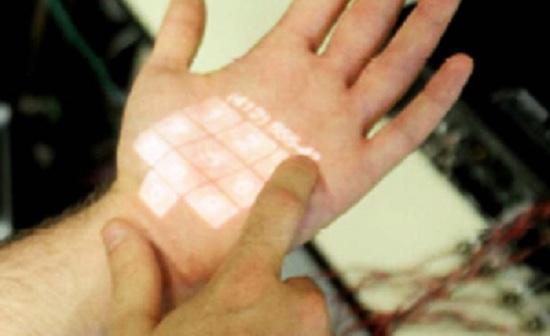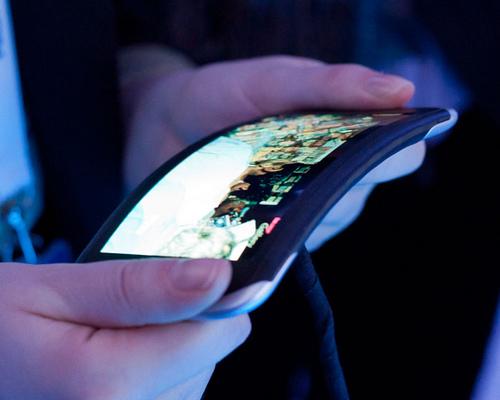
Right after the movie Real Steel released into theaters, I wrote an article about phones with a complete lack of physical buttons. I did that because I actually liked the way that the phones in the movie were showcased. I know, I know, there were robots punching one another a lot, but hey, I like phones. Anyway, I liked their concept phones quite a bit, and I think it would be a pretty cool idea at some point in the future. I’m not sure when that will be, but I can hope that it’s sometime soon.
After all, Microsoft likes the idea, too.
Over the weekend, Total Recall starring Will Ferrell finally came out, and I saw it. I’m obviously not going to get into the movie too much here, but as you can imagine there’s plenty of science-fiction things to take away from the movie. Most importantly, the phones.
In the movie, there are “normal” phones. Devices that people hold in their hands, talk into, and anything else you’d expect from a device you’d see today. Not very futuristic, if nothing else. But that changed pretty quickly near the middle part of the movie, when the main character, Douglas Quaid, finds a phone in his hand.
Yes, you read that correctly, and you know what I’m talking about if you’ve seen the movie. The phone is literally in his hand. It’s not some kind of phone tied to his DNA or something ridiculous like that, either. It’s an actual collection of circuits and piece of hardware, strung together to make a phone in the palm of his hand. Of course, you’d need some way to see what you’re doing on the phone, so when it activated lights turned on from under the skin. Interestingly enough, from what I can remember, the main character didn’t actually interact with the lights to input anything into the phone. He just held his hand up to the side of his face and talked.
Now, while that’s cool on its own, it actually gets better. When Quaid wanted to see who he was talking to, he put his hand up to glass. Not some specialized glass, or a table, or anything like that. Just glass. And boom, there’s a live camera feed of who the person was on the other end of the line. I actually smiled when I saw this part of the movie, because it’s just awesome. It would only be cool if they had to put their hand on some specialized “surface” to get the job done, but they just needed to touch glass and the phone’s video feed and call options showed up there in a digital, touch-based interface.
There’s a moment in the movie where someone on the street, a kid, asks him, “What is that, and how can I get it?” Or something similar to that. That stood out to me, because even there in this fictional futuristic world, there were still gadgets that people didn’t know about. Didn’t already have. Weren’t the standard. This kid was so wowed by a phone in Quaid’s hand that he realized he had to have one for himself. That’s how great technology is supposed to be. We see a phone, or a tablet, or whatever else and we realize that we need to know more. We know we just have to have it.
But are we ready? As a people, are we ready for the next major leap in technology? Especially when it comes to our mobile devices, or wearable technology? I would love to think that the answer is yes, that we are certainly ready to embrace that next level of innovation and ingenuity, but I’m not sure that I can. With those reports of Doctor Steve Mann being harassed while wearing augmented reality glasses in France. And, just watch someone’s surroundings while they play a motion-based game on their tablet, even if it is 7-inches. People stare and crack jokes.
It stands out, and sometimes not in a good way. Maybe most of the time. Great advances in technology may be hindered by the fact that people don’t seem to be ready to incorporate it into their day lives quite yet. We want to play it safe, with physical devices with displays that we’re accustomed to. Yes, we love touchscreens, but other than resolutions and clarity, they haven’t changed much. Off the top of my head, despite how often we used to hear about flexible displays, I can only think of Samsung’s Galaxy Nexus that has a curved panel.

What happened to those flexible AMOLED displays? I’m sure they are still being researched, but why don’t we have a device out in the wild yet? Wouldn’t that be the next great tablet? I know I would love to be able to fold up my phone and put it in my pocket. I’d definitely not care about screen size then.
Project Glass from Google is a fantastic idea, even if it will probably be expensive when it finally lands in the wild. It is a way to get us into the next stage of technology. We need a revolution, not just evolutionary steps, and Project Glass can help us get there.
So I’m curious, Dear Reader. If you had to pick a company, a smartphone manufacturer, that you’d trust to take the next big leap in technology, which company would you choose? HTC? Samsung? Apple? What about a company like Research In Motion? Let me know in the comments.